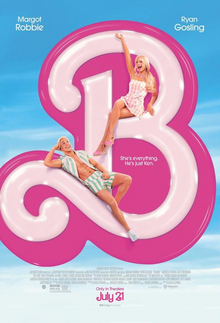
Greta Gerwig’s “Barbie” is ingeniously crafted in many ways. From the script to the casting, intertextuality, and the social commentary provided by satire, there is much to admire about the film.
“Barbie” follows Margot Robbie, our lead, as her life in Barbie Land (where she lives with all other iterations of Barbie and Ken) begins to crumble. Her toast is burnt, her milk has expired, she is having thoughts of death, and instead of floating down from her dream house (in typical Barbie fashion), she gets thrown to the ground. What were originally small setbacks in her morning escalate as she develops cellulite and FLAT FEET.
Barbie’s friends direct her to talk to Weird Barbie, who advises her to either live in ignorance or venture into the real world, find her human counterpart, and mend the divide between reality and Barbie Land. Robbie’s character, stereotypical Barbie, reluctantly decides to venture into the real world, and her boyfriend Ken invites himself along.
They immediately realize how different the real world is from Barbie Land, especially concerning gender roles and dynamics. Barbie is stunned to learn that the Barbie brand hasn’t solved all feminist issues as previously believed. After a brief encounter with Mattel, she meets her human counterpart and decides to bring her back to Barbie Land. Meanwhile, Ken returns to Barbie Land with a newfound obsession with patriarchy, which he learned about in the real world.
Upon returning, Barbie is surprised to find an overthrown Barbie Land that now reflects the gender inequities Ken encountered during his recent adventure. She resolves to save Barbie Land with the help of its outcasts—Alan, Weird Barbie, and discontinued versions of Barbie and Ken.
Gerwig’s latest film is filled with foils and contrasts that highlight the differences in gender roles between reality and Barbie Land. This is emphasized by our lead’s repeated transitions between worlds, which serve as satire.
Barbie draws attention to gender inequities through contrasts: “Geez, you would think a construction site at lunchtime would be the perfect place for a little woman power, but this one was so… male.” This is one of the first comments Barbie makes upon entering reality. The film criticizes societal expectations of women: “it is literally impossible to be a woman”.
Gerwig even criticizes the film industry for its gender inequities: “There is no just Ken. That’s why I was created”. Hollywood often writes female characters into scripts with only one purpose: to be a wife, girlfriend, or love interest for male main characters. This culture pervades the industry and defines Hollywood’s style. Gerwig uses satire to criticize this aspect of movie culture.
Gerwig uses Barbie to address gender inequity and roles through satire, disguised contrasts, and role reversals, delving deeper into societal issues.
Barbie distinguishes itself and owes much of its success to its fun and comedic tone while telling a thought-provoking story about our society. Gerwig takes the concept of sexism and presents it in the appealing package of lighthearted, pink Barbie Land.
Some may dismiss this masterpiece as a passing trend, but this movie is a must-see as a powerhouse of social commentary.
